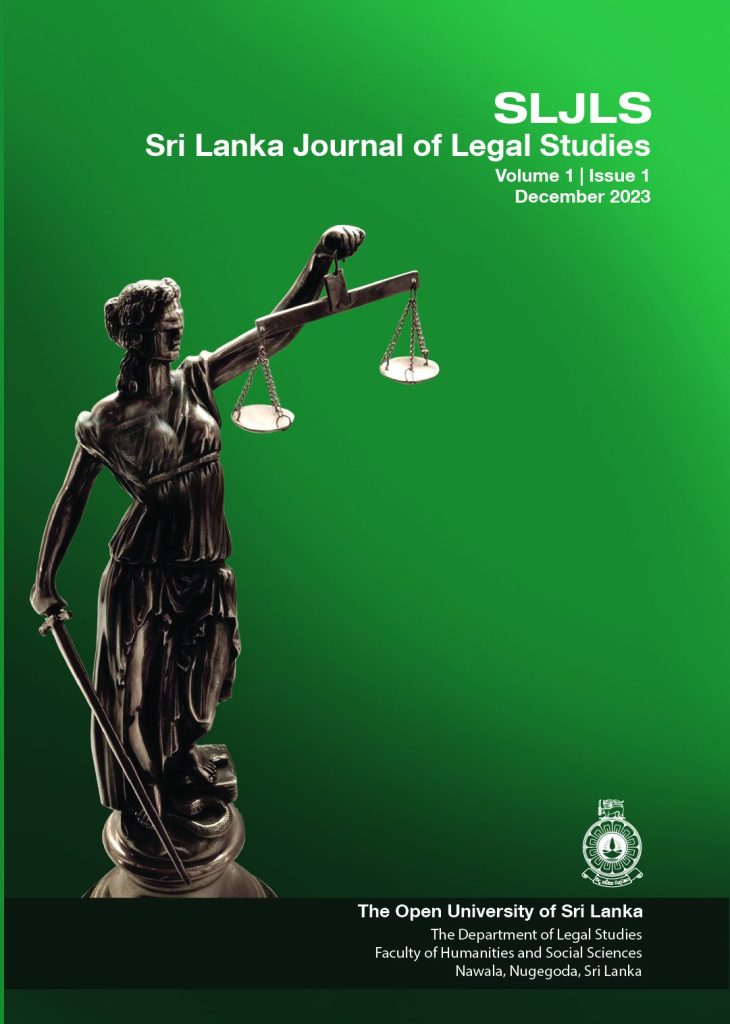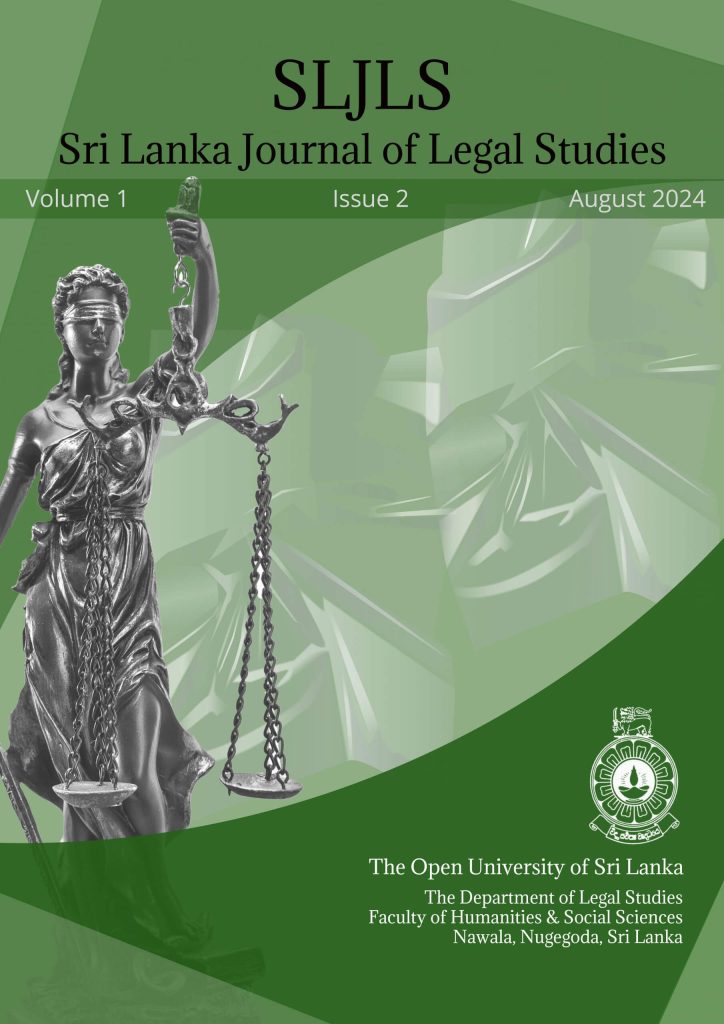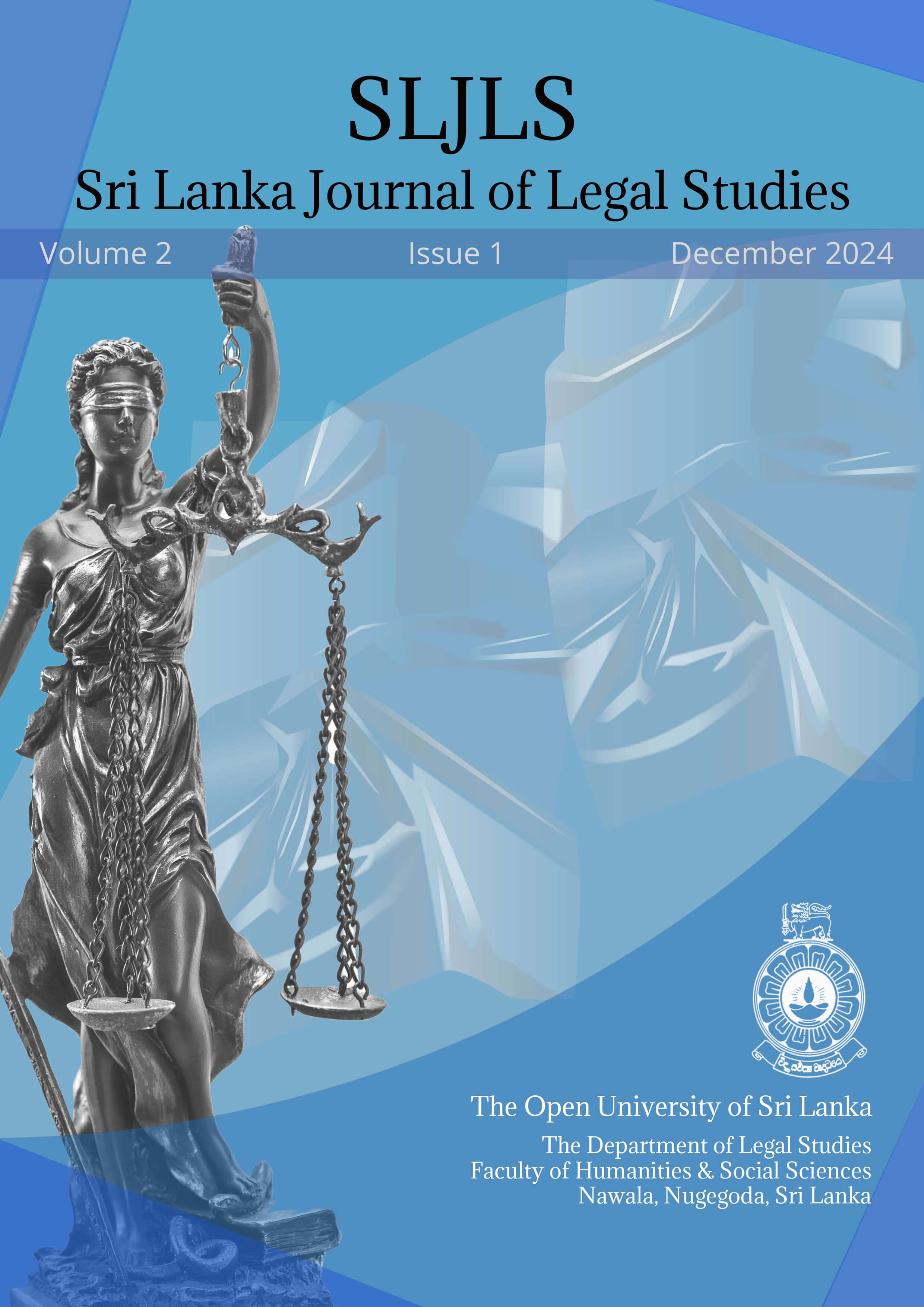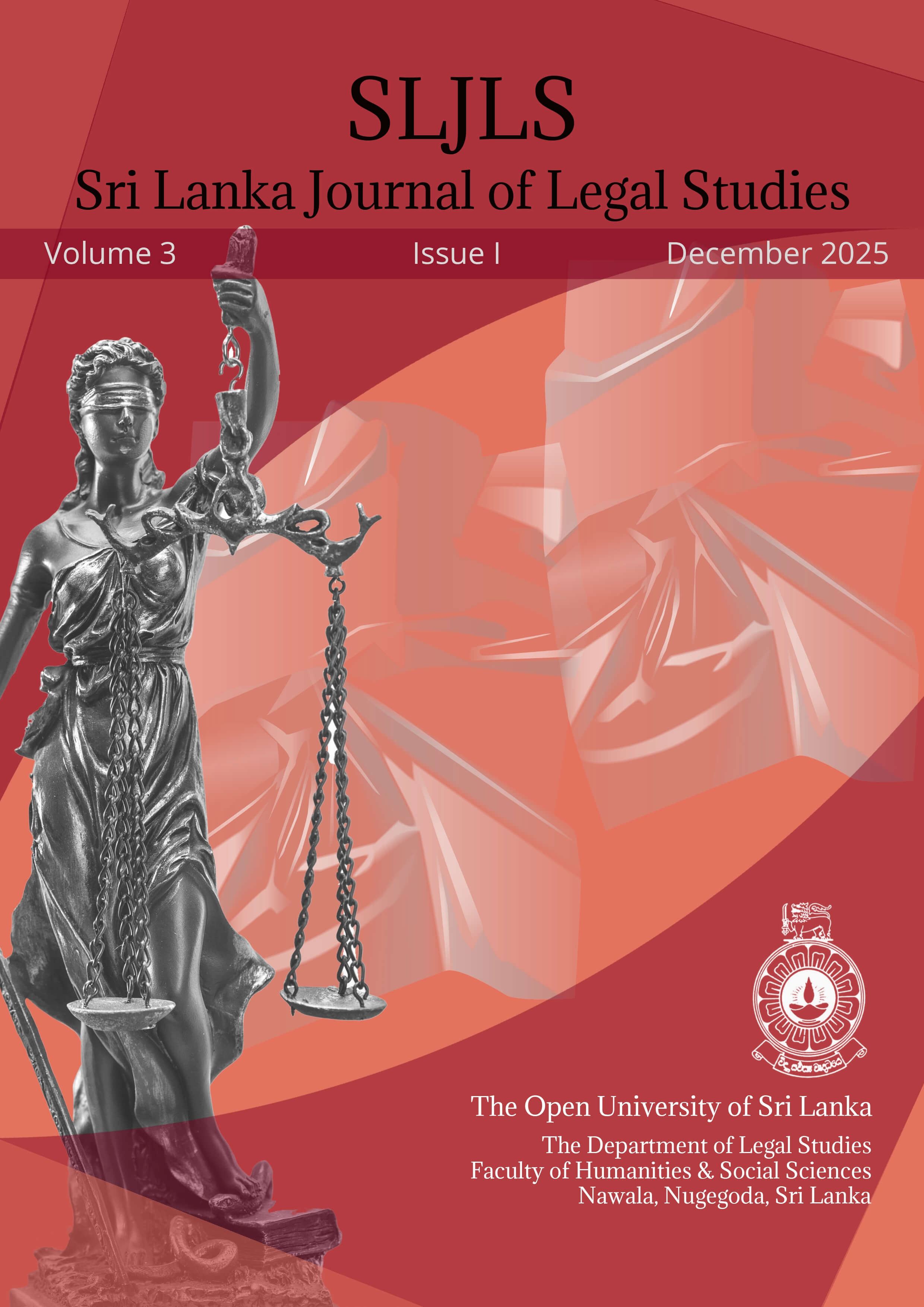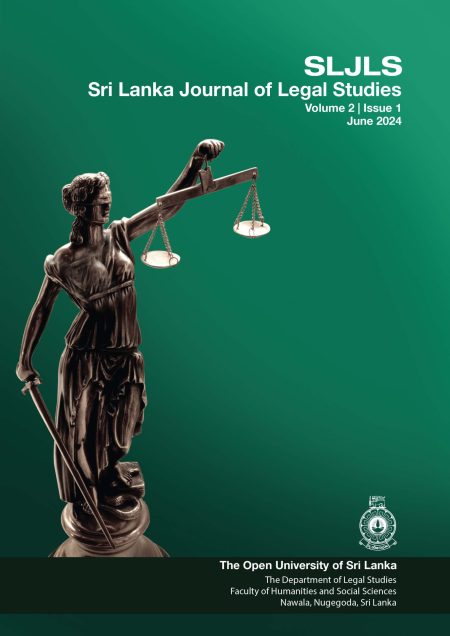
Sri Lanka Journal of Legal Studies (SLJLS)
Editor-In-Chief: Prof Sanath Sameera Wijesinghe
The submission deadline : 20th August 2025
Journal Information
The Sri Lanka Journal of Legal Studies (SLJLS) is the official journal of the Department of Legal Studies of the Open University of Sri Lanka (OUSL). Considering the dearth of journals in legal studies, the mission of SLJLS is to launch a double-blind, peer-reviewed, free-of-charge, and open-access journal, which would enrich existing legal literature and provides opportunities for legal scholars to publish their findings and contribute to the global legal knowledge.
The SLJLS will be helpful for undergraduate and post-graduate law students in many state universities in Sri Lanka to find relevant legal knowledge for their studies. This journal can also be used in many aspects such as finding solutions to social issues, policy changes, writing judgments, and law-making processes. Additionally, the SLJLS will provide an opportunity for global scholars to learn the comparative aspects of legal systems, including Sri Lanka’s diverse legal system, and best practice examples for contemporary legal issues.
Contact Information
All editorial correspondence should be addressed to:
The Editors
Sri Lanka Journal of Legal Studies (SLJLS)
Department of Legal Studies
The Faculty of Humanities and Social Sciences
The Open University of Sri Lanka
Nawala, Nugegoda, Sri Lanka
Email: sljlsou@gmail.com
Telephone: +94112881432
Aims and Scope
The Sri Lanka Journal of Legal Studies (SLJLS) is an international, double-blind, peer-reviewed journal which publishes by the Department of Legal Studies, The Open University of Sri Lanka with high quality, and original research contributions to legal knowledge.
SLJLS covers academic contributions on diverse subject matters of legal studies in international, regional, and national contexts. This journal aims to provide an opportunity to publish and disseminate research findings of local and overseas legal scholars. Three types of contributions are available for the authors, including research articles, book reviews and case analysis. The contributions will be selected based on the standard of analysis, academic rigor, and the practical significance.
Editorial Board & Advisory Board
Editor in Chief
Prof Sanath Sameera Wijesinghe
Editorial Board
Dr Raja Goonaratne
Ms Niluka Damayanthi
Ms S Janaka
Ms Geethani Jeewanthi
Ms Nissanka Jayarathne
Ms Ruwanthika Ariyaratna
Advisory Board
Professor Tina Cockburn
Director of the Australian Centre for Health Law Research
Faculty of Business and Law
Queensland University of Technology
Brisbane, Australia
Professor M. Sornarajah
Emeritus Professor
Faculty of Law
National University of Singapore
Singapore
Professor T. Ramakrishna
Chair Professor of Intellectual Property Law
National Law School of India University
Bangalore, India
Professor N.S. Punchihewa
Dean, Faculty of Law
Professor in Department of Commercial Law
University of Colombo, Sri Lanka
Professor S.S.M.W. Senevirathne
Chair Professor in Department of Public and International Law
Faculty of Law
University of Colombo, Sri Lanka
Hon. Dr. Saleem Marsoof
Former Judge of the Supreme Court of Sri Lanka
Sri Lanka
Editorial Assistants
Ms Dinithi Ranasinghe
Ms Yashoda Thilakarathne
Published By
The Department of Legal Studies
Faculty of Humanities and Social Sciences
The Open University of Sri Lanka
Nawala, Nugegoda, Sri Lanka
Editorial Policies
Peer review process
Articles published in SLJLS undergo a Double-blind peer-review process. The following steps are included in the peer-reviewing process.
a) Submission of paper by the author/authors.
b) Screening the manuscripts by the editorial board and deciding the suitability for sending to review.
c) Find two suitable reviewers.
d) Agreeing with the name of reviewers by the editorial board.
e) Sending the manuscript to two reviewers with relevant guidelines and a timeline for review.
f) Receive feedback from the reviewers.
g) The editorial board decides the status of the manuscripts and communicates with the authors.
Criteria for acceptance/rejection of the manuscripts
The following criteria will be used to decide the status of the manuscript.
First reviewer | Second reviewer | Status |
Accept as it is | Minor revisions | Accept |
Minor revisions | Minor revisions | Accept and send the manuscript to the author to incorporate the comments and suggestions |
Minor revisions | Major revisions | (a) Accept and send the manuscript for the author to incorporate the changes. (b) Send the revised version of the manuscripts to the reviewers |
Major revisions | Minor revisions | (a) Accept and send the manuscript for the author to incorporate the changes. (b) Send the revised versions of the manuscripts to the reviewers |
Major revisions | Major revisions | (a) Accept and send the manuscript for the author to incorporate the changes. (b) Send the revised versions of the manuscripts to the reviewers |
Reject | Minor revisions | Send the manuscript to a third reviewer |
Reject | Major revisions | Reject the manuscript |
Reject | Reject | Reject the manuscript |
Copyright and plagiarism
As an author, respecting copyright laws and ensuring ethical and legal use of information in your scholarly pursuits is essential. When engaging in scholarly work, obtaining permission, or using resources authorised for use is crucial. The unauthorised use of copyrighted materials violates the creators’ intellectual property rights and can lead to copyright infringement. We seek to protect the rights of our authors and we always investigate claims of plagiarism or misuse of published articles. Equally, we seek to protect the reputation of the journal against malpractice. Submitted articles may be checked for duplication. Where an article, for example, is found to have plagiarised other work or included third-party copyrighted material without permission or with insufficient acknowledgement, or where the authorship of the article is contested, we reserve the right to take action including, but not limited to: publishing an erratum or corrigendum (correction); retracting the article; or taking up the matter with the head of department or dean of the author’s institution and/or relevant academic bodies or societies.
For further reference, please visit the OUSL Copyrights Policy – http://lib.ou.ac.lk/copyright-clearance-service/
Reference style
SLJLS adheres to the OSCOLA reference style.
For further reference, please visit https://www.law.ox.ac.uk/sites/default/files/migrated/oscola_4th_edn_hart_2012.pdf to ensure your manuscript conforms to this reference style.
Author Guidelines
Types of submission
♦ Research articles
Research articles are expected to be between 5,000-6,000 words, including figures, tables, and footnotes. Every research article should be accompanied by an abstract of 250-300 words and a maximum of five (5) keywords. The research articles should include a title, abstract, introduction, methodology, discussion, recommendations, and conclusion.
♦ Book reviews
SLJLS publishes critical reviews of selected books in the field of legal studies. Book reviews are expected to be a maximum of 3,000 words, including footnotes. SLJLS expects the book reviews to be well-structured and analytical regarding the contribution of the selected work, rather than producing a concise summary. A book review must consist of a title other than the title of the selected book itself. Additionally, it should include, introduction to the book, analysis and conclusion.
♦ Case analysis
SLJLS invites authors to submit case analysis with practical significance and greater impact on reshaping the existing legal principles. Case analysis is expected to be between 1,500-2,000 words, including footnotes. The case analysis should be structured on the following headings:
* Title
* Facts of the case
* A summary of arguments
* Significance
* Conclusion
Preparation of manuscripts
♦ Format of the manuscripts
Prepare your manuscript using a word-processing method, MS Word (.doc or .dox format). The title and each paragraph of the manuscript need to be justified and heading and sub-headings need to be left aligned.
♦ Language and style
The UK/Oxford English style should be used in the manuscript. SLJLS strongly recommend the authors whose first language is not English to obtain the service of professional language editor/proof-reader to avoid typos, errors, and confusions in the manuscript. This will help to expedite the review and publication processes.
♦ Text formatting
Use B5 paper size. Text should be justified. Use 11-point font size. Use Arial font. Use 1.5 line spacing. Page numbers should be centered on the bottom margin. All margins should be one inch..
Title | Separate line centered over text, font size 12, bold, uppercase |
Abstract | Justified, font size 10, indent 0.5’ both left and right margins |
Keywords | Left align, font size 10, bold, italics, lowercase |
Sub-heading 1 | Left align, font size 11, bold, uppercase |
Sub-heading 2 | Left align, font size 11, bold, sentence case |
Sub-heading 3 | Left align, font size 11, italics, sentence case |
* Figures
All figures should be numbered consecutively as ‘Figures’ (Figure 1, Figure 2) with cross references in the main text. Figures should consist of an appropriate and concise heading. The figure numbers and titles should be placed below the figures. Avoid placing figures before their first mention in the text. Any figures not based on the authors’ original data should have source notes with a corresponding footnote.
* Tables
All tables should be numbered consecutively as ‘Tables’ (Table 1, Table 2) with cross references in the main text. Tables should consist of an appropriate and concise heading. The table numbers and titles should be placed on top of the tables. Avoid placing tables before their first mention in the text. Any tables not based on the authors’ original data should have source notes with corresponding a footnote.
♦ Conflict of interest statement
All authors should include a statement on conflict of interest disclosing any financial or other substantive conflicts of interest that may be construed to influence the results or interpretation of their research. All sources of financial support for the project should be disclosed at the end of the manuscripts.
♦ Acknowledgement (if any)
The acknowledgment should be brief and made for specific scientific, financial, and technical assistance only. If a significant part of the research was performed in an institution other than in those indicated by the authors’ affiliations given in the title page, this fact should be acknowledged. All those who have made substantial contributions to the research but do not qualify to be authors should be acknowledged.
Declaration by the authors
The declaration form must be signed and returned by the corresponding author via email (scanned copy) along with the submission.
Submission of manuscripts and editorial correspondence
All editorial correspondence should be addressed to:
The Editors
Sri Lanka Journal of Legal Studies (SLJLS)
Department of Legal Studies
The Faculty of Humanities and Social Sciences
The Open University of Sri Lanka
Nawala, Nugegoda, Sri Lanka
Manuscripts should be submitted to sljlsou@gmail.com


